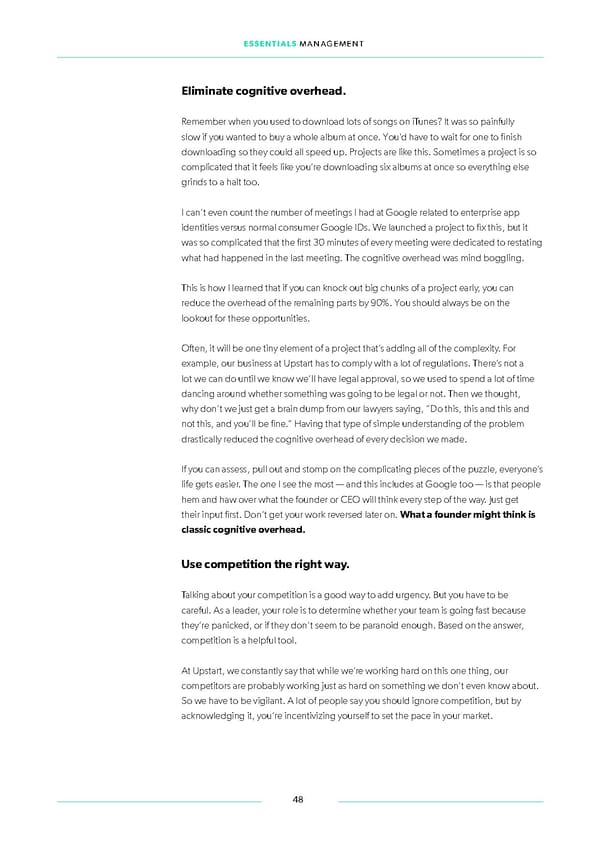ESSENTIALS MANAGEMENT Eliminate cognitive overhead. Remember when you used to download lots of songs on iTunes? It was so painfully slow if you wanted to buy a whole album at once. You’d have to wait for one to ifnish downloading so they could all speed up. Projects are like this. Sometimes a project is so complicated that it feels like you’re downloading six albums at once so everything else grinds to a halt too. I can’t even count the number of meetings I had at Google related to enterprise app identities versus normal consumer Google IDs. We launched a project to ifx this, but it was so complicated that the ifrst 30 minutes of every meeting were dedicated to restating what had happened in the last meeting. The cognitive overhead was mind boggling. This is how I learned that if you can knock out big chunks of a project early, you can reduce the overhead of the remaining parts by 90%. You should always be on the lookout for these opportunities. Otfen, it will be one tiny element of a project that’s adding all of the complexity. For example, our business at Upstart has to comply with a lot of regulations. There’s not a lot we can do until we know we’ll have legal approval, so we used to spend a lot of time dancing around whether something was going to be legal or not. Then we thought, why don’t we just get a brain dump from our lawyers saying, “Do this, this and this and not this, and you’ll be ifne.” Having that type of simple understanding of the problem drastically reduced the cognitive overhead of every decision we made. If you can assess, pull out and stomp on the complicating pieces of the puzzle, everyone’s life gets easier. The one I see the most — and this includes at Google too — is that people hem and haw over what the founder or CEO will think every step of the way. Just get their input ifrst. Don’t get your work reversed later on. What a founder might think is classic cognitive overhead. Use competition the right way. Talking about your competition is a good way to add urgency. But you have to be careful. As a leader, your role is to determine whether your team is going fast because they’re panicked, or if they don’t seem to be paranoid enough. Based on the answer, competition is a helpful tool. At Upstart, we constantly say that while we’re working hard on this one thing, our competitors are probably working just as hard on something we don’t even know about. So we have to be vigilant. A lot of people say you should ignore competition, but by acknowledging it, you’re incentivizing yourself to set the pace in your market. 48
 Essentials Management First Round Capital Page 47 Page 49
Essentials Management First Round Capital Page 47 Page 49